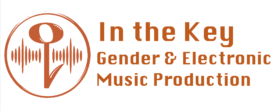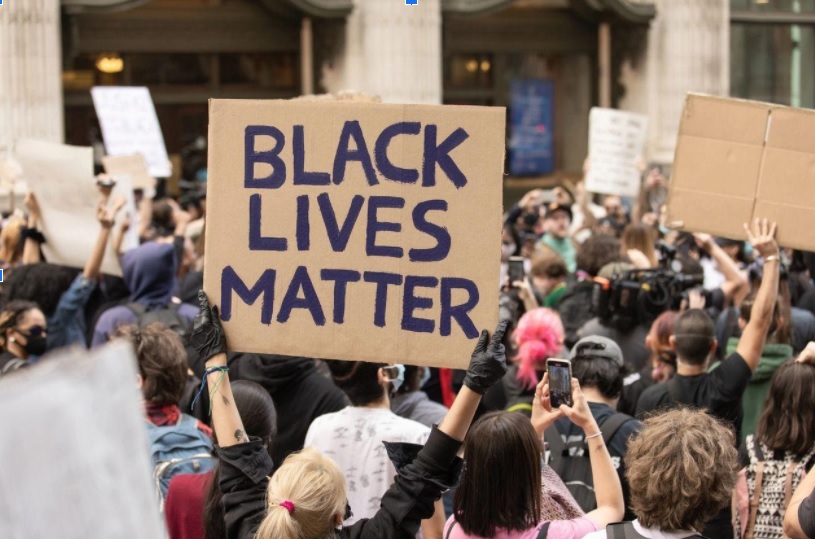On Tuesday June 2nd 2020, the music industry pressed pause on their everyday activities to devote the day to education and reflection about how black, indigenous, people of colour (BIPOC) are systematically oppressed by white supremacy on a daily basis, all over the world. Prompted by the police murder of George Floyd in Minneapolis, USA, the day was interpreted differently by those who took part, and as a white, British woman I chose to confront my discomfort and start to educate myself about white privilege, unearned power, and how I might use those things for good. This post details what I learned, what I read, and the steps I will take to create change through the In the Key of She project.
1. Change starts from within.My day began with some honest reflection on how and when I’ve been ‘colour blind’ in my decisions about my research, and my own actions as a human being. I’m pleased to say that I began this work some weeks back when I realised that the producers I featured on the ItKoS radio show were a very white bunch of women. Of the 17 episodes I’ve produced, only 5 of the featured women are not white. I’ve interviewed more people of colour behind the scenes, but the radio show is the public face of the research, so representation is vital if diversity is going to be normal in the music industry, not the exception. There were other reflections too. Like the time I realised I’d only interacted in a meaningful way with other white, European women after the first day of the MeetSSS conference in Portugal last October. I’d been aware of this, along with other things, but had chosen to deprioritise doing much about it. This quote on the SheSaid.so anti-racism resourceswas a huge catalyst for me ‘Staying silent is not an option; it is a passive stamp of approval for racist behavio[u]r’, as was reading Tatiana Mac’s ‘Save The Tears: White Woman’s Guide’.
2. Is it really unconscious bias?This is a dangerously passive and sanitising term. I think we may be in danger of using it to excuse us from avoiding inclusive behaviours because ‘it’s too hard’ or it feels too uncomfortable to go down those roads. And that’s white privilege right there – I am free to ignore race, trans, or queer issues because of who I am and the unearned power I’ve inherited. When I was writing the funding application for In the Key of She, I remember feeling irritated by a colleague’s insistence I explicitly include intersectionality in my analytical framework, because taking an intersectional approach is complicated and hard (how whiny does that sound?!). Wasn’t it enough that I was proposing to do good work by addressing gender issues and systems of sexism in the electronic music industry? But to talk about ‘women in the electronic music industry’ without taking into account other identity positions, is actually just talk about ‘white, western, cis-women who are probably reasonably well educated and affluent. Elisabeth Schussler Fiorenza calls this the ‘kyriarchy’ – systems of interlocking social structure that result in differing patterns of advantage and disadvantage for all of us. I learned that yesterday too.
3. Empathy and reflection feel like useful (if imperfect) tools.I can never know what it’s like not to be a beneficiary of white privilege. Ironically, I think this fact has stopped me from learning more about racism up until now. So I read Peggy McIntosh’s 1988 essay ‘White Privilege: Unpacking the invisible knapsack’and used her list of over 40 ways she recognised white privilege in her own life to try and empathise with all the things I take for granted. It was sobering. I knew these things, but I had never really tried to feel them. The only way to tackle unconscious bias and passive (but wilful) avoidance is to make the bias conscious. I’ve found this can be helped by comparing situations faced by others to ones that are more familiar to me (in my case gender, class, and age) A black woman I interviewed for In the Key of She told me how much she hates people touching her hair when she’s in a club. I’ve never had that happen to me, and I doubt it ever would, but I know how uncomfortable and invaded I feel when a man puts his hand on my lower back to move past me in a crowd. This technique is a bit like looking in one of those distorted mirrors on a blind bend in a country road – it’s not a perfect reflection of another’s reality, but at least it helps you see your blind spot better.
4. Decentre yourself.I feel guilt and shame that my skin colour and race makes me complicit in the way BIPOC people are treated all round the world (and BIPOC was also an acronym I learned though Black Out Tuesday). But those are my problems as Amélie Lamont’s ‘Guide to Allyship’reminds us: ‘Acknowledge that while you, too, feel pain, the conversation is not about you.’ It’s hard not to make it all about you, and there’s a fine line between using the distorted mirror I describe above to feel inequality more deeply, and reducing others’ experience to your own frames of reference in the process. Allying yourself to a cause to adorn your own identity is another centring tactic. ‘My cause is not your handbag’ was one way a woman of colour fought back on Facebook against those who blacked out their profile pictures, posted messages of sympathy, but took no action.
5. Guilt and shame are not productive emotions.Up until yesterday I let those emotions stop me from being proactive about ensuring race issues (as well as queer ones) were foregrounded in my study. I’ve had no trouble considering age, or class for example, because I have an affinity with those systems of oppression. I really liked this statement from Peggy McIntosh: “Describing white privilege makes one newly accountable. As we in women’s studies work to reveal male privilege and ask men to give up some of their power, so one who writes about having white privilege must ask, “having described it, what will I do to lessen or end it?”
6. We have been taught not to see racism and to accept whiteness as ‘normal’.The majority of images we see in the Media, on TV, in video games, magazines and everywhere else are of white people, or where black people appear its ‘for a reason’. While watching a BBC TV series a few months ago, I was pulled up sharply by a question that wandered into my head: “Why are there more black and disabled characters in the TV adaptation than I imagined when I read the book?” The answer of course is why not!? I am so used to seeing people of colour, queer or disabled folk only when their ‘otherness’ is central to their role – and my imaginative default is clearly white. The English language is also full of racist terms that silence others’ realities. ‘Flesh’ to denote a pale beige/pink colour tone is now thankfully all but eradicated, but we still talk of ‘expatriates’ to refer to British (read: white) folk going to live abroad, while the loaded ‘immigrant’ comes to live here. We use ‘colonise’ in our history books as a benign word to describe violent invasions, theft of land and atrocities to indigenous people. In school I learned a joyous and proud tale of ‘the pilgrim fathers’ setting sail to ‘discover’ America and ‘settle’ – an obscene distortion of the truth.
7. Increasing representation means positive action and that’s uncomfortable. To be fair, I knew this already from my work on female visibility, but what I have learned is that I must deliberately seek out people of colour and include them in what I do, or ‘pass them the mic’ as one article I read put it. I must do that regardless of how fearful I am of offending someone by appearing tokenistic or overly focused on their race, because this is the only way we are going to take down the whitewash. I hear this all the time in relation to female producers and DJ’s: ‘I don’t book/ buy/ select/ promote/ choose on the basis of gender, only on the basis of good music’. Actively seeking out people of colour, (or women, gender non-conforming, gay, trans or any other ‘minority’ individual) does not mean that their contribution is not good! But if you don’t actively seek minorities out, their contributions most likely won’t be seen. Meritocracy is a discourse of privilege – if you’re offered only music from white people, if all the people in your networks, and all the people you encounter are white, then of course ‘good music’ is going to be white, or male, or straight, or whatever else the characteristics of the majority are. And nothing will ever change. We need to move from ‘colour blind’ to ‘colour conscious’ as recent anti-racist scholarship advocates
8. Racism is not just acts of mean-ness and violence. I have also been taught that racism is something that disadvantages others, rather than advantages me. Racism is largely understood as a moral issue and not being racist means not behaving in a way that disadvantages others on the grounds of their race and colour. But this stops us thinking how our unearned power and white privilege advantages us in ways that necessarily mean there is less space for, or less acceptance of others. Learning this makes me aware of a power I don’t want to have because basically it means others suffer just because of who I am. But it’s a power I have been benefitting from all my life and would sure as hell notice if it were gone.
9. De-colonialising/ de-whiting my writing and teaching is important for everyone.It’s not just important so that my BIPOC students feel included, or because it’s good practice in an international, globalised world – it is an important step in raising awareness of white privilege among white people, so that in future generations it might be eroded.
I don’t know whether to be pleased or shocked that I learned so that many things in just one day where I hardly scratched the surface of the huge number of anti-racism resources out there. What I will do next is to continue to educate myself, and importantly to reflect on things that feel painful and easier to avoid than confront. In concrete terms for In the Key of She this means:
- Continue to seek out women of colour to ensure their voices are represented in the research and on the platform;
- Reflect on my assumptions and actions (or inactions) whenever I feel avoidant or uncomfortable – and act on those reflections;
- Diversify my own music collection to include more music by people of colour – and play their music publicly;
- Explicitly develop an intersectional analysis of the research data
- Further educate myself and others about the black, indigenous, women of colour who pioneered electronic music and continue to struggle to be heard today.

